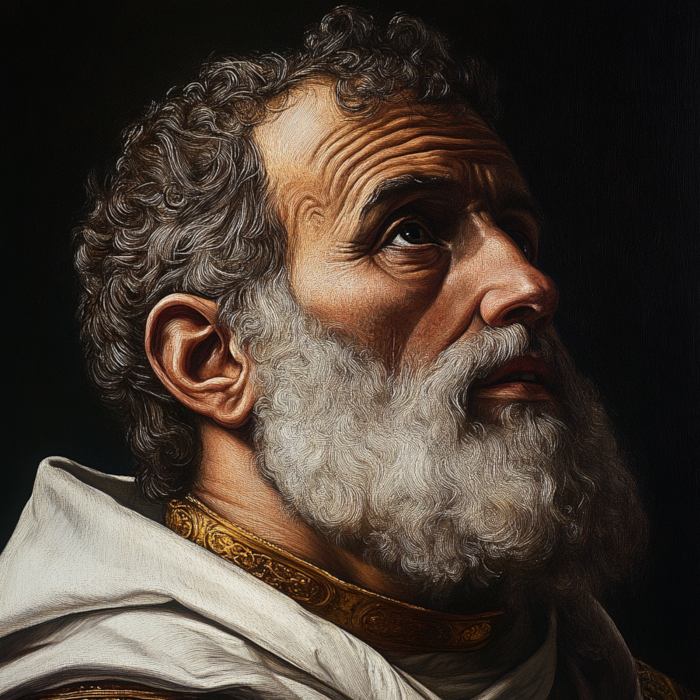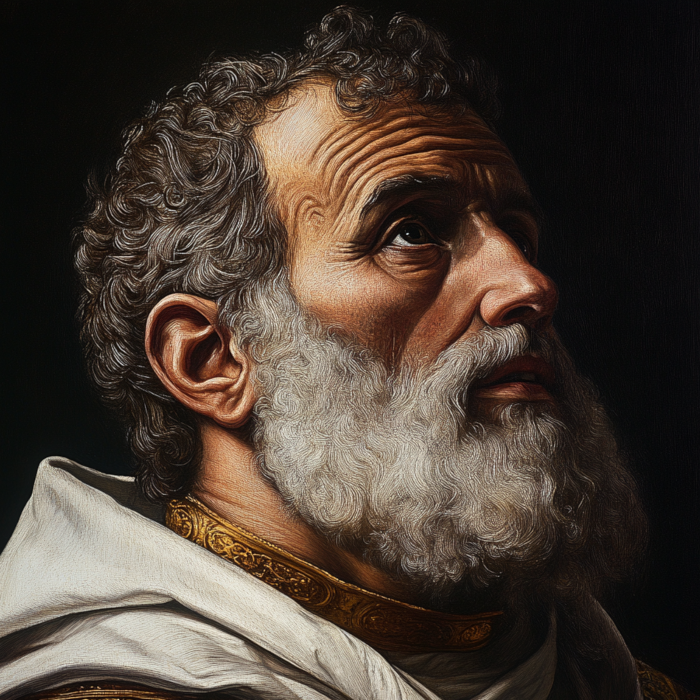


Augustine of Hippo (354–430 CE), also known as Saint Augustine, was an early Christian theologian and philosopher whose writings and teachings have had a profound influence on the development of Western Christianity and philosophy. As the Bishop of Hippo Regius (located in present-day Annaba, Algeria), Augustine became one of the most important Church Fathers, contributing significantly to Christian doctrine, particularly in areas such as original sin, grace, and the nature of the Church. His works, including Confessions and The City of God, remain central to Christian theology and Western thought.
Birth and Family: Augustine was born on November 13, 354 CE, in Thagaste, a small town in the Roman province of Numidia (modern-day Souk Ahras, Algeria). His father, Patricius, was a pagan and a Roman official, while his mother, Monica, was a devout Christian. Monica’s faith deeply influenced Augustine throughout his life, even during his years of skepticism and philosophical searching.
Education: Augustine was sent to Carthage, the leading city in Roman North Africa, to receive a classical education. He excelled in rhetoric, the art of persuasive speaking and writing, which was highly valued in Roman society. During this time, Augustine was introduced to various philosophical ideas, including those of Plato and the Neoplatonists, which would later influence his own thought.
Life in Carthage: As a young man, Augustine led a hedonistic lifestyle and fathered a son, Adeodatus, with a woman who remained his concubine for many years. He was deeply interested in philosophy and became involved with the Manichaeans, a religious sect that combined elements of Christianity, Zoroastrianism, and Gnosticism. Augustine was initially attracted to Manichaeism because it offered a dualistic explanation of the problem of evil, dividing the world into forces of light and darkness.
Disillusionment and Search for Truth: Augustine eventually became disillusioned with Manichaeism, finding its explanations unsatisfactory. He continued his search for truth, exploring various philosophical schools, including skepticism and Neoplatonism. His reading of Neoplatonism, particularly the works of Plotinus, played a significant role in shaping his understanding of God and the nature of reality.
Conversion to Christianity: Augustine’s conversion to Christianity was a gradual process marked by intense personal struggle. He was deeply influenced by the sermons of Ambrose, the Bishop of Milan, and by the letters of Saint Paul. According to his own account in Confessions, his conversion reached a climax in 386 CE when, during a moment of inner turmoil, he heard a child’s voice urging him to "take up and read." He opened the Bible and read a passage from the Epistle to the Romans, which he interpreted as a direct call to give up his worldly life and embrace Christianity. He was baptized by Ambrose in Milan in 387 CE, alongside his son Adeodatus.
Becoming a Bishop: After his conversion, Augustine returned to North Africa, where he was ordained a priest in 391 CE. Four years later, he was consecrated as the Bishop of Hippo, a position he held until his death. As bishop, Augustine was deeply involved in pastoral care, theological disputes, and the administration of the Church.
Doctrine of Original Sin: One of Augustine’s most significant theological contributions was his development of the doctrine of original sin. He argued that humanity inherited the sin of Adam and Eve, the first humans, and that this original sin tainted all human beings, making them inherently sinful and in need of God’s grace for salvation. This doctrine became a central tenet of Western Christianity, particularly in Roman Catholicism and Protestantism.
Grace and Free Will: Augustine also wrote extensively on the nature of grace and free will, particularly in his debates with the Pelagians, a group that believed human beings could achieve salvation through their own efforts without the need for divine grace. Augustine countered that human free will was impaired by original sin and that only God’s grace could enable individuals to choose good and achieve salvation. His teachings on grace heavily influenced the development of Christian theology, especially during the Protestant Reformation.
The City of God: In response to the sack of Rome by the Visigoths in 410 CE, Augustine wrote The City of God, a monumental work that sought to defend Christianity against accusations that it was responsible for the decline of the Roman Empire. Augustine argued that there were two cities: the earthly city, characterized by human sinfulness and the pursuit of worldly power, and the City of God, characterized by the love of God and the pursuit of eternal salvation. This work laid the groundwork for the Christian understanding of the relationship between the Church and the state, and it remains a foundational text in Christian political thought.
Confessions: Augustine’s Confessions is one of the most famous and influential works of Christian literature. Written as an autobiographical account of his spiritual journey, Confessions is not only a narrative of Augustine’s life but also a profound exploration of human nature, sin, and the search for God. The work is notable for its introspective and reflective style, and it has had a lasting impact on both Christian spirituality and the Western literary tradition.
Final Years: Augustine spent his later years as a bishop in Hippo, where he continued to write, preach, and engage in theological debates. He was a prolific author, producing numerous sermons, letters, and treatises on a wide range of topics, including theology, philosophy, and biblical exegesis. His works addressed various controversies of his time, including those with the Donatists (a schismatic Christian sect) and the Manichaeans.
Death: Augustine died on August 28, 430 CE, during the siege of Hippo by the Vandals, a Germanic tribe that was invading the region. His death occurred at a time of great turmoil in the Roman Empire, as the Western Empire was in the process of collapsing. Despite these challenges, Augustine’s influence continued to grow in the centuries that followed.
Sainthood and Doctor of the Church: Augustine was canonized as a saint by the Catholic Church, and he is also recognized as a saint in the Eastern Orthodox Church and the Anglican Communion. He was later declared a Doctor of the Church, a title given to saints who have made significant contributions to theology and doctrine.
Influence on Western Christianity: Augustine’s theological ideas have profoundly shaped Western Christianity, particularly in the areas of original sin, grace, and the nature of the Church. His writings influenced key figures of the Middle Ages, such as Thomas Aquinas, and played a crucial role in the development of medieval Scholasticism. Augustine’s ideas were also central to the Protestant Reformation, with reformers like Martin Luther and John Calvin drawing heavily on his teachings.
Philosophical Contributions: Augustine is also regarded as a key figure in the history of Western philosophy. His integration of Christian doctrine with Neoplatonism created a philosophical framework that influenced later Christian thinkers. His reflections on time, memory, and the nature of the self in Confessions have been studied by philosophers and theologians for centuries.
Cultural and Literary Influence: Augustine’s Confessions is not only a theological work but also a masterpiece of Latin literature. Its introspective style and exploration of personal identity have influenced a wide range of literary genres, from autobiography to existential philosophy. The work continues to be read and studied for its insights into the human condition and the spiritual journey.
Theological Controversies: Augustine’s teachings have not been without controversy. His doctrines of original sin and predestination have been debated and sometimes criticized within Christian theology. However, his influence remains enduring, and his works continue to be a central part of Christian theological education.
Augustine of Hippo is one of the most influential figures in the history of Christianity and Western thought. His contributions to theology, philosophy, and literature have left an indelible mark on the development of Christian doctrine and the intellectual tradition of the West. Augustine’s writings, particularly Confessions and The City of God, continue to inspire and challenge readers, offering profound insights into the nature of God, the human soul, and the complexities of faith. His legacy as a theologian, philosopher, and saint endures, making him a towering figure in the history of ideas.

We use cookies
We use cookies and other tracking technologies to improve your browsing experience on our website, to show you personalized content and targeted ads, to analyze our website traffic, and to understand where our visitors are coming from. Privacy Policy.